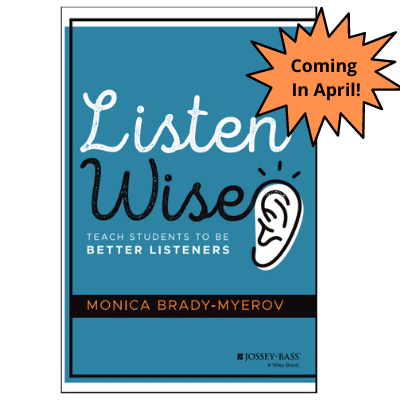Last Updated on September 21, 2022
(Pre-order the book below and get stickers for your class!)
Today’s blog post explores the intersection between listening and reading from chapter 5 in my upcoming book: Listen Wise: Teach Students to be Better Listeners. You can read more about why listening is a skill that matters (chapter 2), the neuroscience behind listening (chapter 3), and how to teach listening (chapter 4).
When my younger daughter was in the third grade, she was struggling to read at the same rate as her classmates. She could decode smaller words but struggled with more complex phonic challenges such as multisyllabic words. She hopped over words. And she often read words incorrectly. For example, she read the word “like” as “lick.” Even as she got older, she sometimes made simple words more complex, such as reading the word “recent” as “reception.” She didn’t realize it didn’t make sense. And often she didn’t know she’d read the word incorrectly.
She was tested for a reading disability. She went to an eye specialist to determine if it was an eye tracking issue. Her reading problems were diagnosed using a process of elimination to determine what they weren’t. She wasn’t a classic dyslexic. She didn’t have eye tracking problems. She started to get pull-out reading help. But then I noticed something at home.
Since I was a reporter for NPR, news radio was the backdrop to everything that happened in our kitchen and in our car. For a long time, I didn’t even think my two daughters were listening to the news with me. As they grew older, they would sometimes ask questions about a story, surprising me with their deep understanding of a complex topic. But I didn’t know how connected listening skills and reading skills were until my younger daughter was in the 3rd grade. She was asking me very sophisticated questions about stories she heard on NPR. She was listening and understanding the high level of academic vocabulary in audio stories.
If I had given my daughter the printed transcript of the radio story, she would not have been able to read it. The sentences and words were too complex. This discovery led me to support her with more audiobooks and podcasts. Those audio books enabled her to grasp the concepts and content she needed to learn. They engaged her in subjects beyond what she could read on the page. I selected NPR stories for her to listen to that complemented what she was studying in school so she would feel confident going into class to learn.
The realization of the interconnectedness between listening and reading compelled me to start Listenwise, because I could see how listening to podcasts supported her and could help others.
In learning how to help my daughter, I learned that better listeners make better readers. This is documented by studies that show listening skills have been linked to literacy at an early age. A true picture of a student’s literacy lies in understanding both reading and listening skills together, according to research. But not everyone understands how powerful this connection is and what you as a teacher or parent can do about it. I saw the powerful connection in my own daughter and used what I learned to help others with Listenwise.
My daughter’s academic future has not been hampered by her reading struggles, but I know she is lucky in that regard. And I think about how much more she will learn and contribute when she becomes a more fluent reader.
Pre-order my book before March 30th, and I’ll send “I Love Podcasts” stickers for you and your students!
You can pre-order at Amazon, Barnes & Noble, Books-a-Million, Target and Bookshop.
Then drop me an email (monica@listenwise.com) with your receipt and mailing address to get your stickers!

